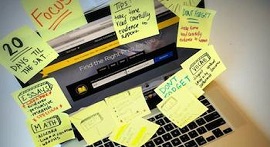Academics
Philadelphia's Temple University is a large public university that offers "strong academic programs, vibrant student life, [and a] prime location in Philadelphia ... that collectively contribute to a rich and fulfilling educational experience for its students." Students also report that "the research and job opportunities are one of the best things here at Temple," and they laud the robust Honors Program and the benefits of "the professional connections [from] having such a big alumni community." Additionally, with offerings across 17 schools and colleges, there are "amazing mentorship/internship opportunities," with even more focused growth coming from Student Professional Organizations (SPOs), which are "like a club for your specific major." All told, "the sheer range of major-minor combinations and skill sets ... creates a very unique collaborative environment."
Students say of the faculty that "it's evident that they genuinely love what they do, and this enthusiasm is contagious." They "show...pride in their specialties" and "have a ton of work experience and most still work in their field so they can give you up-to-date information on what's going on." A student testifies, "They are all extremely well-credited and amazing teachers." The flipped classroom approach is often used "to provide more time for questions and participation in lecture," and the curriculum includes the "teaching of modern technologies important for the job market." There are also "frequent guest lectures at multiple academic departments that give students opportunities to connect and network...and learn from their paths." Whatever path a student chooses to lay, students say the bricks are there: "If a student is hardworking and highly motivated, it is possible to make a name for yourself both within [and without] the university."
Student Body
At Temple "everyone has their own style," with one student proudly believing this makes them "one of the most unique student bodies I've seen on a college campus." The school is described as having "lots of diversity in things like gender, race, and sexuality," but everyone is linked by being "extremely hard-working students...who all care about their academic career however are all still fun and outgoing." Another student says, "Everyone at Temple truly wants the best for themselves and others, and that is very clear." A rising tide lifts all boats, and there are "a ton of groups dedicated to helping fellow students. There are always class group chats and study sessions, and a lot of peer tutoring" which is why attendees note that "Temple is great with providing an inclusive environment." Those thinking of attending ought to know that even though "a lot of people work part time at Temple and are very busy," they're all still "very friendly, open minded, free spirited, and devoted."
Campus Life
Temple is a large commuter school, but whether enrollees live on-campus or not, they acknowledge "the housing is beautiful and all spaces around campus are structurally comfortable." Students also note that "dining options are fantastic" thanks to the inclusion of "many food trucks around campus with many good foods to choose from after or before class." Those looking for activities should know that the pace of life is heavily reliant not just on workload but on temperature. When it's warm outside, students are everywhere, the campus is alive and vibrant, and people are happy. When it's cold,...everyone hunkers down." This Division I school "has great sport teams and great recreation facilities and learning halls," and students pride themselves on a number of "on-campus clubs that emphasize community service." The university also "has a lot of easily accessible public transport (subway station, train station, multiple bus stations, bike rentals) and is very close to Center City and other popular areas," which serves the needs of "people [who] like to explore the city aspect of Philadelphia."




